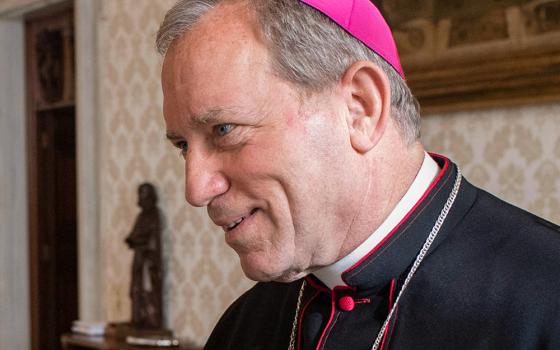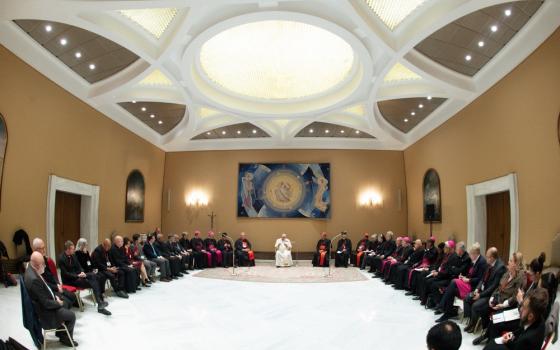By JOHN L. ALLEN JR.
Beirut
On the final leg of his three-day trip to Lebanon, Pope Benedict XVI used some of his strongest language to date on the Syrian crisis, asking plaintively “Why so much horror? Why so many dead?” and demanding an immediate halt to “the din of weapons.”
Benedict directed his plea for "Syria and neighboring countries," but it seemed clear the civil war in Syria was foremost in his mind.
Though they may represent a rhetorical escalation, Benedict’s words today do not appear to add any new substance to the Vatican’s diplomatic position on the Syrian conflict, which some critics on both sides have described as “elusive” and “overly prudent.”
“Sadly, the din of weapons continues to make itself heard, along with the cry of the widow and the orphan,” the pope said. “Violence and hatred invade people’s lives, and the first victims are women and children.”
In addition to an appeal to the international community, Benedict also called on Arab nations “that, as brothers, they might propose workable solutions respecting the dignity, the rights and the religion of every human person!”
Benedict asked God to grant Syria and the entire Middle East “the silencing of weapons and the cessation of all violence.”
The comments came at the end of an open-air Mass on Beirut’s waterfront this morning that attracted an estimated 350,000 people, mainly Lebanese but with pockets of believers from across the Middle East, including a sizeable group of Syrians – many of whom are refugees in Lebanon.
Benedict also touched on Syria during a youth rally last night, directly addressing Syrians in the crowd and telling them, “The pope has not forgotten you,” and that he is “saddened by your sufferings and your griefs.”
To date, estimates put the total number of casualties as a result of the fighting in Syria at somewhere between 23,000 and 38,000. Since the outset of the crisis, Benedict XVI has repeatedly called for peace and a diplomatic solution, but the Vatican has not taken a clear position on what exactly that solution might look like.
The most developed statement from the Vatican so far has come from Monsignor Miguel Ángel Ayuso Guixot, a Colombian and the number two official at the Pontifical Council for Interreligious Dialogue, during an Istanbul conference earlier this month on the “Arab Awakening.”
In his speech, Ayuso outlined a four-point Vatican position on Syria:
- An immediate end to violence “from whatever part”
- Dialogue “as the necessary path to respond to the legitimate aspirations of the Syrian people”
- Preserving the unity of the Syria, “regardless of ethnicity and religious affiliation”
- An appeal to the international community to commit itself to a peace process
That statement leaves key questions unanswered, such as whether the Vatican believes the government of President Bashar al-Assad should stay or go, and whether an armed international response would be warranted to impose a cease-fire.
In late July, a Vatican spokesman said the country is experiencing a “slow descent into hell,” but also called the prospect of an armed international response “very worrying.” On the papal plane en route to Lebanon, Benedict XVI called the importing of arms into Syria a “grave sin,” but didn’t make clear whether he meant the arming of the Assad regime, the rebels, or both.
Most observers would say that an immediate end to importing weapons might actually benefit Assad, since the Syrian army had a considerable head start over rebel forces in the arms race.
t
tThe Vatican’s caution has been tweaked in various quarters.
On Saturday, a leading Turkish daily commenting on Benedict's Lebanon trip called the pope’s line on Syria “elusive,” complaining that the pope has not opposed a Western push against Assad despite fears among Syrian Christians that regime change could make their lives worse. The editorial contrasted Benedict unfavorably with Russian Orthodox Patriarch Kirill, who has largely echoed the pro-Assad position of the Kremlin.
Meanwhile, a well-known Italian Jesuit who spent thirty years in Syria before being expelled over the summer, Fr. Paolo Dall’Oglio, has complained that the Vatican has not supported the uprising. He recently tweaked the Vatican’s unwillingness to support international intervention, saying that if the Vatican doesn’t believe foreign troops have a legitimate role to play in keeping the peace, then what are the Swiss Guards doing in St. Peter’s Square?
In an interview with the French daily Le Figaro ahead of the trip to Lebanon, the pope’s Secretary of State, Italian Cardinal Tarcisio Bertone, responded to criticism that the Vatican has been “overly prudent”.
“The Church’s position is not neutral, it is just clear: violence simply leads to more violence! Violence leads to death,” Bertone said.
"The pope [has] accepted the aspirations of the Syrian people as legitimate, repeatedly inviting all leaders to abstain from violence and commit to dialogue and reconciliation,” he said.
In sum, Benedict’s words today would not appear to move the Vatican any closer to either a pro-Assad or pro-rebel position. On balance, they appear to cut against support for an armed international response, at least for now. They would also seem to express a preference for the diplomatic heavy lifting to be carried out by Arab states, rather than global superpowers such as the United States, Russia and China.
Syria is of special concern to the Vatican, in part because it contains a significant Christian minority. The roughly 2.3 million Christians represent ten percent of the population, with the largest denomination the Greek Orthodox Church, followed the Greek Melkite Catholics.
This morning’s Mass on the Beirut waterfront was the largest public event on Benedict’s three-day itinerary, and the security presence was correspondingly thick. The area was crowded with soldiers bearing automatic weapons, and throughout the morning the sky was dotted with military helicopters patrolling the airspace.
Benedict wraps up his trip this afternoon with an ecumenical meeting at the Syriac Catholic basilica and a departure ceremony at the Rafiq Hariri Airport before returning to Rome.
In a briefing with reporters after this morning's Mass, the Vatican spokesperson, Jesuit Fr. Federico Lombardi, described the trip as an "historic event" and said that "we could not have hoped it would go any better."




